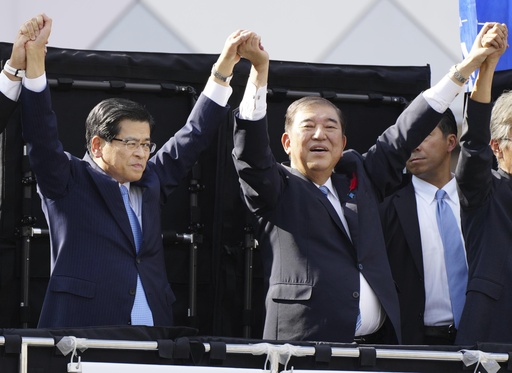
TOKYO — The ruling party of Japan, led by Prime Minister Shigeru Ishiba, is facing its most significant challenge in over a decade as the country approaches a parliamentary election on Sunday.
Despite only recently taking office, Ishiba’s leadership is already under scrutiny due to various corruption scandals and declining public support. While he might be held accountable and potentially resign as both the party leader and prime minister, it is unlikely to result in a major shift in power. The Liberal Democratic Party (LDP), which has maintained steady control since 1955, continues to overshadow a fragmented opposition that has only briefly held power in the past.
Analysts believe that the opposition group, the Constitutional Democratic Party of Japan (CDPJ), is poised to gain ground in the elections; however, their gains are not expected to alter the current administration significantly.
A 48-year-old office worker, Kanako Ojima, expressed her intention to vote, indicating she prefers to see the LDP remain in power due to their supposed long-term vision.
The LDP has cultivated a robust support network that includes bureaucrats, businesses, and regional leaders. While opposition parties have made some headway in urban areas, they struggle to penetrate the rural heartland, where the LDP effectively channels substantial government subsidies.
Ishiba called for the elections immediately after taking office on October 1, aiming to leverage his reformer image to mitigate voter dissatisfaction. However, predictions suggest the LDP may lose several seats and may not meet the targets established by Ishiba for his ruling coalition. Even if the situation worsens, the LDP will likely remain the leading party within the governing bloc.
The LDP’s dominance in Japanese politics stretches back to its formation in 1955, when it emerged from the merger of two significant conservative parties amid growing concerns about communism in post-war Japan. The party’s rule has faced just two interruptions, during which time it was briefly replaced by a coalition government amid bribery scandals. Over the decades, the LDP has played a crucial role in Japan’s remarkable economic resurgence, which saw the nation rise through the ranks to become one of the world’s largest economies by the 1980s.
The main opposition party, the Socialist Party, has struggled to assert its influence, often referred to as the “perennial opposition.” More recently, the Socialist Party has rebranded itself as the Social Democratic Party.
Electoral reforms following the LDP’s loss to a coalition government have resulted in a new voting system designed to foster competition. This system combines single-member districts with proportional representation, allowing Liberal Democratic candidates to focus their efforts on individual races rather than competing against others from their party. This arrangement often contributes to the entrenchment of powerful families in political roles, with women representing only 10% of the lower house. The LDP has set an ambitious goal of increasing female candidates to 30% within the next decade.
Internal factions within the LDP have historically enabled connections built on shared conservative values, strong defense initiatives, and calls for constitutional revisions. Until recently, these factions generated competition for resources among lawmakers, resulting in frequent leadership changes in a bid to rejuvenate the party. Ishiba’s rise to leadership followed the resignation of his predecessor Fumio Kishida, who stepped down as a result of backlash over a scandal involving slush funds.
The party’s reliance on the Komeito party, which is aligned with a prominent Buddhist group, helps bolster their support, especially in rural areas. The partnership has its roots in 1999 during a time of LDP struggles. The LDP also draws backing from various industry organizations, including agricultural and fisheries groups.
The main opposition party, the CDPJ, led by centrist former Prime Minister Yoshihiko Noda, has not managed to gain substantial momentum despite the ongoing scandals surrounding the LDP. Noda’s recent comments suggest the necessity of shifting toward conservative stances to attract moderate voters, indicating that a government change could represent valuable political reform.
Although the CDPJ is expected to make notable gains in the upcoming elections, their fractured nature as a coalition makes it improbable for them to challenge the ruling government effectively. The comparison to past opposition efforts highlights the difficulties faced by parties aiming to disrupt the well-established dominance of the LDP.
Voter disinterest in shifting away from the LDP is evident, with many expressing a desire for continued leadership amidst calls for reform. Rintaro Nishimura, a political analyst, noted the LDP’s strong history of accomplishment in governance. Nonetheless, as newer generations express increasing dissatisfaction over the party’s policies, future electoral shifts may eventually emerge; however, significant changes remain unlikely in the imminent future due to the current opposition’s capabilities being uncertain.
